Book contents
- Frontmatter
- Contents
- List of figures
- List of tables
- Notes on contributors
- Preface
- Editors' notes and conventions
- Introduction
- Part I Policy and diversity in the twenty-first-century primary school
- Part II The range and focus of applied linguistics research
- Part III Empowering teachers and teachers' use of knowledge
- Introduction to Part III
- 15 Building knowledge about language into a primary teacher education course
- 16 Using the International Phonetic Alphabet to support accurate phonics teaching
- 17 Developing word-level literacy skills in children with and without typical communication skills
- 18 The development of the Speech, Language and Communication Framework (SLCF)
- 19 How to empower teachers working with children with language impairments: why a ‘just-in-time’ model might work
- 20 Communication impairment in a multilingual context
- 21 Teacher education and applied linguistics: what needs to be understood about what, how and where beginning teachers learn
- References
- Index
Introduction to Part III
Published online by Cambridge University Press: 26 April 2011
- Frontmatter
- Contents
- List of figures
- List of tables
- Notes on contributors
- Preface
- Editors' notes and conventions
- Introduction
- Part I Policy and diversity in the twenty-first-century primary school
- Part II The range and focus of applied linguistics research
- Part III Empowering teachers and teachers' use of knowledge
- Introduction to Part III
- 15 Building knowledge about language into a primary teacher education course
- 16 Using the International Phonetic Alphabet to support accurate phonics teaching
- 17 Developing word-level literacy skills in children with and without typical communication skills
- 18 The development of the Speech, Language and Communication Framework (SLCF)
- 19 How to empower teachers working with children with language impairments: why a ‘just-in-time’ model might work
- 20 Communication impairment in a multilingual context
- 21 Teacher education and applied linguistics: what needs to be understood about what, how and where beginning teachers learn
- References
- Index
Summary
Authors in Part III have applied linguistic knowledge in ways that are directly useful to teachers in the classroom to support their understandings of children's language and literacy development. For all authors, the common aim is for linguistic understandings to become part of teachers' professional knowledge, to be used as practical and functional analyses and teaching methodologies.
To these ends, Henrietta Dombey and Jane Briggs outline the Knowledge about Language strand at the University of Brighton, introducing student teachers to linguistic knowledge in the context of texts used by and with children, aiming to provide powerful tools for graduates to develop children's language, reading and writing. Greg Brooks makes the case for teachers understanding the rudiments of the internationally recognised phonetic alphabet, in order to appreciate, discuss and analyse the complexities of English phoneme-grapheme correspondences. Kenn Apel and his colleagues deal with word-level literacy, teaching to develop children's phonemic, orthographic morphological and semantic awareness and mental imagery in order to spell, and pinpointing the precise learning needs of children with language-learning difficulties. Mary Hartshorne notes that teachers are one group amongst the wider children's workforce who require extensive knowledge about speech, language and communication. She outlines the development and use of a self-assessment Speech, Language and Communication Framework that allows individuals to assess their own level of competence in these areas, from a universal level needed by the whole workforce to a postgraduate, extension level.
Information
- Type
- Chapter
- Information
- Applied Linguistics and Primary School Teaching , pp. 201 - 202Publisher: Cambridge University PressPrint publication year: 2011
